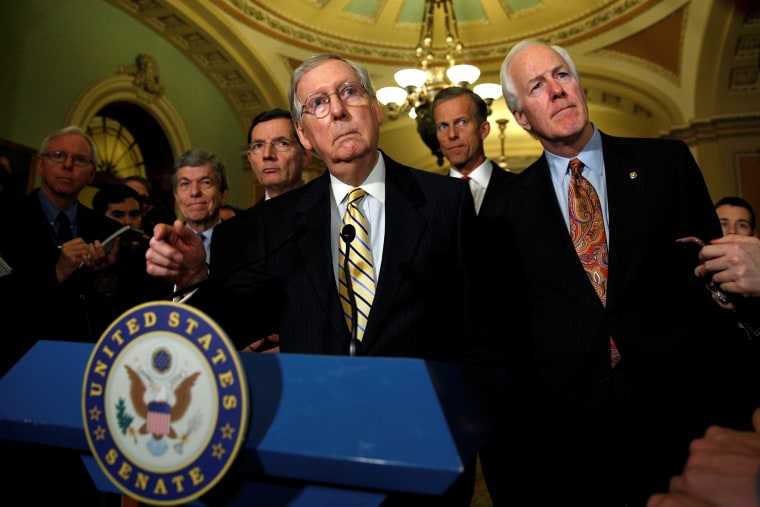Yesterday afternoon, the New York Times published a headline that briefly sparked some optimism for those hoping to see the government shutdown end. It read, "Senate Leaders Reach Deal That Offers Possible Path to Reopen Government." Alas, that wasn't quite right.
Democratic and Republican Senate leaders did reach an agreement yesterday, but it was a procedural deal on this week's legislative calendar. The upper chamber will hold votes tomorrow on bills to end the shutdown -- these will be the first votes the Senate has held on the issue since before the shutdown began -- but neither bill is expected to pass.
The Senate is scheduled to vote Thursday afternoon on two competing bills that aim to re-open the federal government, Senate Majority Leader Mitch McConnell, R-Ky., announced Tuesday, the 32nd day of the partial government shutdown.While the 2:30 p.m. ET vote will mark the first time the Senate will take action to end the shutdown since it began on Dec. 22, both pieces of legislation are expected to fail.
The first bill will be the Republicans' proposal, crafted by Donald Trump's White House, which would allocate $5.7 billion for a border wall, while offering Democrats temporary protections for some vulnerable immigrants.
After the GOP's legislation was formally unveiled, many discovered that it also includes some "poison pill" provisions, including harsh new asylum restrictions. The New York Times reported overnight, "White House officials conceded privately on Tuesday they had tacked on controversial proposals anathema to Democrats that would block many migrants from seeking asylum."
It is, in other words, a bill that will not only fail, but is in fact designed to fail. In a White House address on Saturday, the president said, "Both sides in Washington must simply come together, listen to each other, put down their armor, build trust, reach across the aisle, and find solutions."
Evidently, he didn't mean a word of it.
After the Republicans' bill fails, the Senate will also vote on the Democratic alternative: a clean bill that would re-open the government. It will include no extraneous conditions.
Both bills will need to reach the 60-vote threshold, and in all likelihood, neither will succeed. (If the GOP bill were to somehow pass, it would fail in the House. If the Dems' bill were to pass, it would be vetoed by Donald Trump.)
The fact that the Senate will vote at all on the Democratic alternative may seem like a breakthrough of sorts, but it's really just the result of calendar convenience: the agreement between Senate Majority Leader Mitch McConnell (R-Ky.) and Senate Minority Leader Chuck Schumer (D-N.Y.) prevents the chamber from having to work this weekend.
There's a school of thought that says some action is better than no action. The Republican-led Senate literally hasn't even tried to end the shutdown since it began, so some kinetic activity, even on doomed proposals, offers more hope than the alternative.
Perhaps. The fact remains, however, that tomorrow afternoon, on the shutdown's 33rd day, a sensible proposal to end this mess -- a plan Republicans supported as recently as last month -- will be defeated, and a resolution to the crisis will still be nowhere in sight.
